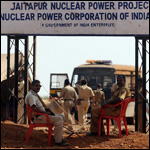Conditions on Indian NSG Membership Pierre Goldschmidt and Toby Dalton | Carnegie Analysis
The question of Indian membership in the Nuclear Suppliers Group (NSG) is reportedly on the agenda for the Group's annual plenary next week in the Netherlands. As the NSG participating governments consider adding new members, the question of conditions for membership becomes paramount.
|
|
John Hooper | The Guardian
The anti-nuclear movement won a crushing victory in Italy on Monday when well over 90% of voters rejected Silvio Berlusconi's plans for a return to nuclear power generation. The result represented an overwhelming setback for the prime minister, who had tried to thwart the outcome by discouraging Italians from taking part. The referendum needed a turnout of at least 50% to be binding. Interior ministry figures projections indicated that more than 57% of the electorate had taken part. Full Article
Howard LaFranchi | Christian Science Monitor
Western experts aren't sure why Iran is speeding up its nuclear enrichment. Is it bravado for domestic political consumption or a genuine move toward developing weapons that can be hidden from attack? Iran's announcement this week that it plans to speed up its enrichment of uranium – and to move part of its enrichment process from the desert to a more defensible mountain site – has spawned wide-ranging speculation on Tehran’s nuclear intentions. Full Article
Mark Hibbs | Arms Control Wonk
I left the M Building at the Vienna International Centre at the end of the day on Thursday just after 6 p.m., as the cleaning brigade arrived to pick up the debris of official statements and coffee cups scattered about the place about an hour after the IAEA's June Board of Governors meeting wrapped up. The arrival of the Putzkolonne upon my departure for the U1 metro and my hotel was appropriate because by the end of the meeting on Thursday things on the ground were certainly a lot messier than they seemed when the board began meeting on Monday. Full Article
Loren Thompson | Forbes
When Barack Obama ran for president in 2008, he embraced a long-held view of the American Left that the best way to deal with the fearsome danger posed by nuclear weapons was to reduce their numbers and then ultimately get rid of all such weapons. The Obama campaign's principal defense issues paper endorsed the goal of a nuclear-free world, stating, "Barack Obama will set a new direction and show the world that America believes in the commitment made under the Nuclear Non-Proliferation Treaty to work to ultimately eliminate nuclear stockpiles." Full Article
Amy Butler | Aviation Week
Nearly two years ago, Defense Secretary Robert Gates unveiled a new incremental strategy to protect much of Europe and the Eastern U.S. from an Iranian ballistic missile attack. The so-called Phased Adaptive Approach (PAA) was designed with increments, each deploying new technologies in 2011, 2015 and 2018, and—eventually—the final phase would provide coverage from intercontinental ballistic missile threats from Iran in 2020. Full Article
|

